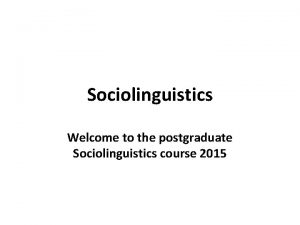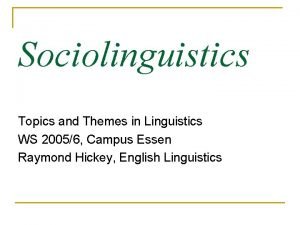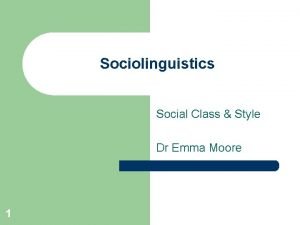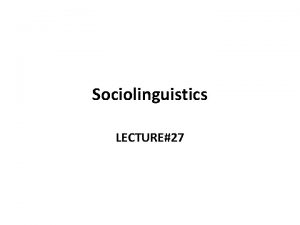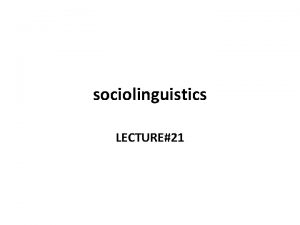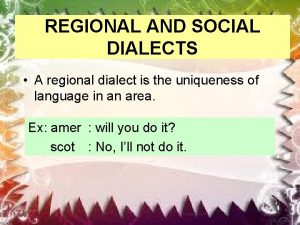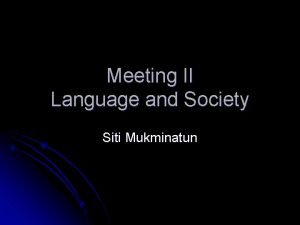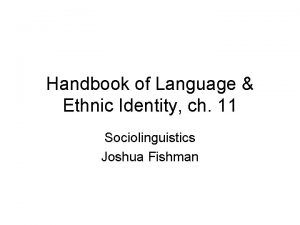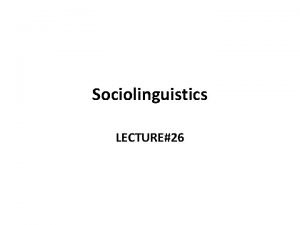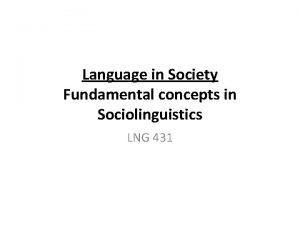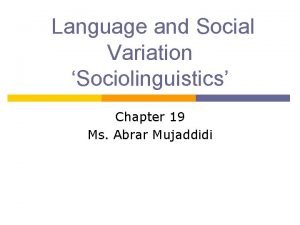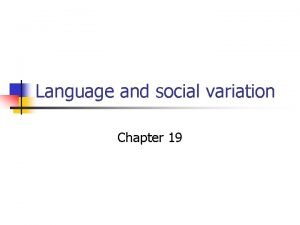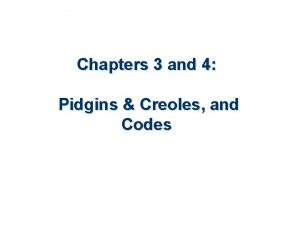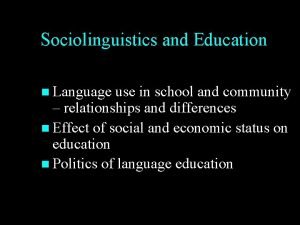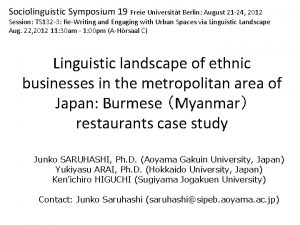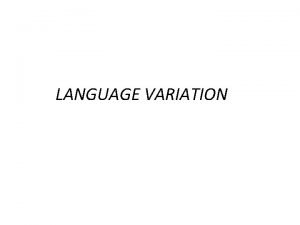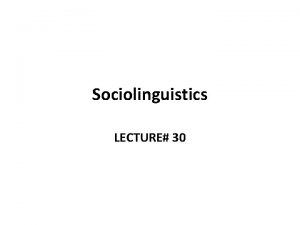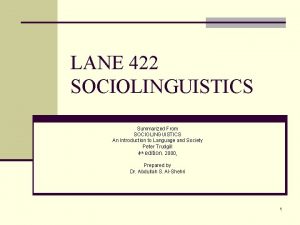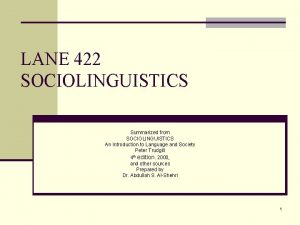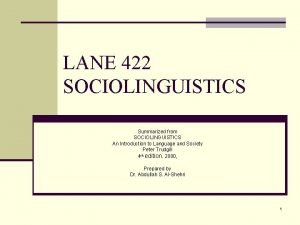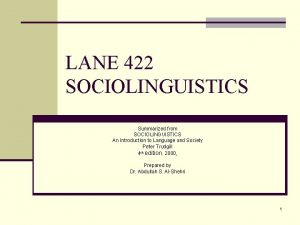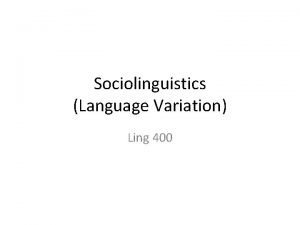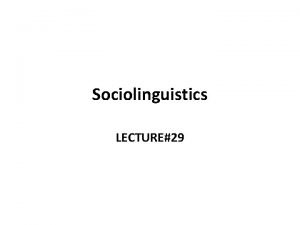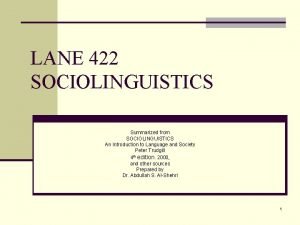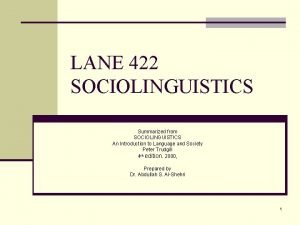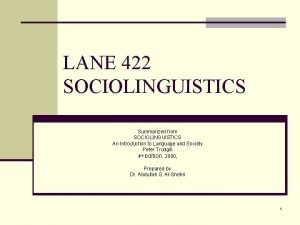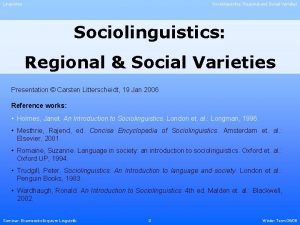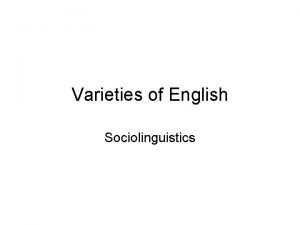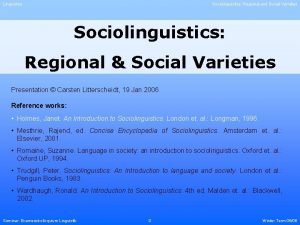SOCIOLINGUISTICS PART 1 REVIEW OF LECTURE 4 Different






















- Slides: 22

SOCIOLINGUISTICS PART 1

REVIEW OF LECTURE 4 • • • Different branches of language Inner world & outer world Psycholinguistics & Sociolinguistics Psycholinguistics – Study of language and brain Psycholinguistics related to mental phenomenon - so mental processes articulated in language behaviour • It studies processes of thought, concept formation and their articulation in language. • This reveal about structures of human psychology and language.

INTRODUCTION • Language is social – cultural, geographical phenomenon. • Deep relationship between language and society • Geographical area considered while studying language (dialects, sociolects etc. )

INTRODUCTION (CONTD. . ) • Language to be looked at from within and without • Language to be studied from both the points of view of form and function • Socio-linguistics – study of speech functions according to the speaker, the hearer, their relationship and contact, the context and the situation

INTRODUCTION • Sociolinguistics also study of the topic of discourse, the purpose of discourse, and the form of discourse • Informal definition: “Who can say what how, using what means, to whom and why”

INTRODUCTION (CONTD. . ) • Sociolinguistics studies the causes and consequences of linguistic behavior in human societies • It is concerned with the function of language. • Studies language from without

INTRODUCTION (INTRO…) • Broad view: • The study of language as part of culture and society. • Other terms: Sociology of language, social linguistics, institutional linguistics, anthropological linguistics, Linguistic anthropology, ethnolinguistics, ethnogrophy of communication

INTRODUCTION • Sociolinguistics deals with the exploration of the relation between language and society • Based on the fact that language is not a single homogeneous entity • It has different forms in different situations • Changes in language occur because of changes in social situations.

INTRODUCTION (CONTD. . ) • Example of changes: social class, gender, regional & cultural groups Speech community: A particular social group speaking a different variety of a language from the rest of the community

VARIETIES OF LANGUAGE • Variation may occur because speakers belong to different geographical regions • Example of English: • RP Received pronunciation, south West of England, Universities of Oxford & Cambridge, & BBC

VARIETIES OF ENGLISH (CONTD. . ) • RP – Formal kind of English associated with educated people • English spoken in the North of England • English spoken in Yorkshire and Lancashire • In Scotland (Scottish English) • In Wales (Welsh English)

VARIETIES OF ENGLISH (CONTD. . ) • Cockney English – spoken by working class people in England (Less educated people) • Indian English • American English • Australian English

LANGUAGE VARIATION & CHANGE • Sociolinguistics – study of language variation and change- how varieties of language are formed when people belong to a geographical region, social class, social situation, and occupation etc. • Varieties formed in various regions involve change in pronunciation and vocabulary both.

VARIATION & CHANGE (CONTD. . ) • Such changes result in the formation of a distinct different variety of language or a dialect. • Sometimes changes present within the same geographical region due to social differences between different economic sections e. g. working class and aristocracy- they result in class dialect

LINGUISTIC FEATURES OF DIALECTS • Syntax variation – ‘I’ve gotten it’, ‘I ain’t seen nothing • Lexical variation – Lift (British English) Elevator (American English) • Dialectology: study of demarcation of dialect boundaries across a region and of specific features of each dialect

DEMARCATION OF DIALECT • Demarcation of dialects done by listing features of a particular region • Isogloss / Dialect boundary: the point at which a certain feature (pronunciation or vocabulary) ceases to be prevalent and gives way to another feature

DIALECT EVOLVE INTO LANGUAGES • Dialect may enjoy prestige and evolve into distinct languages • This happens they are codified, e. g. in literary forms, and grammar and lexicon are standardized. • It happens when a dialect given political and social importance

ANOTHER REASON FOR VARIATION • Specific area of human activity • e. g. English used in different fields – of law, religion, science, sports, business etc. • Every field has specific vocabulary and manner of use – it’s called Register

REGISTERS (CONTD. . ) • Sociolinguistics examine the particular characteristics of different registers. • Examples – Legal registers, scientific register etc. ) • Sociolinguists see how they differ to enable us to understand how language use is tied to social context

REGISTER (CONTD. . ) • Utility: the notion of register important – it shows that language use in communication is not arbitrary or uncontrolled, but governed by rules of situational & contextual appropriateness.

SOCIOLOGY OF LANGUAGE • Sociology of language includes study of attitudes to language by social groups – which language is more / less important, which should be medium of instruction/ second language etc. • Which are legally & constitutionally recognized, their status

SOCIOLOGY OF LANGUAGE (CONTD…) • Sociology of language related to other aspects of social world – political, economical, social etc.
 Chapter review motion part a vocabulary review answer key
Chapter review motion part a vocabulary review answer key 01:640:244 lecture notes - lecture 15: plat, idah, farad
01:640:244 lecture notes - lecture 15: plat, idah, farad Variationist sociolinguistics
Variationist sociolinguistics Sociolinguistics topics
Sociolinguistics topics Define overt prestige
Define overt prestige Language and dialect in sociolinguistics
Language and dialect in sociolinguistics Sociolinguistics
Sociolinguistics Sociolinguistics definition
Sociolinguistics definition What is regional dialect
What is regional dialect What is sociolinguistics
What is sociolinguistics Status scale in sociolinguistics
Status scale in sociolinguistics Ethnicity in sociolinguistics
Ethnicity in sociolinguistics Code switching in sociolinguistics
Code switching in sociolinguistics Register (sociolinguistics)
Register (sociolinguistics) Example of sociolinguistics
Example of sociolinguistics Social variation differences
Social variation differences Social markers in sociolinguistics
Social markers in sociolinguistics Sociolinguistics slideshare
Sociolinguistics slideshare Pidgin examples
Pidgin examples Sociolinguistics and education
Sociolinguistics and education Myanmar restaurant berlin
Myanmar restaurant berlin Regional language variant
Regional language variant Origin of sociolinguistics
Origin of sociolinguistics


